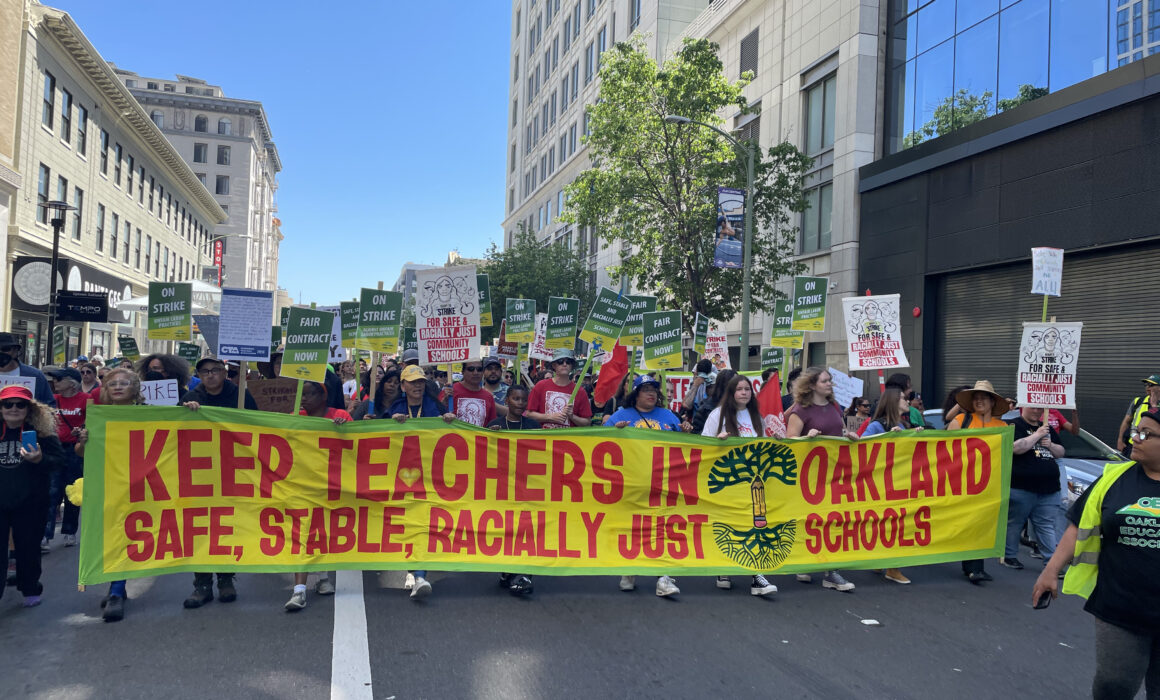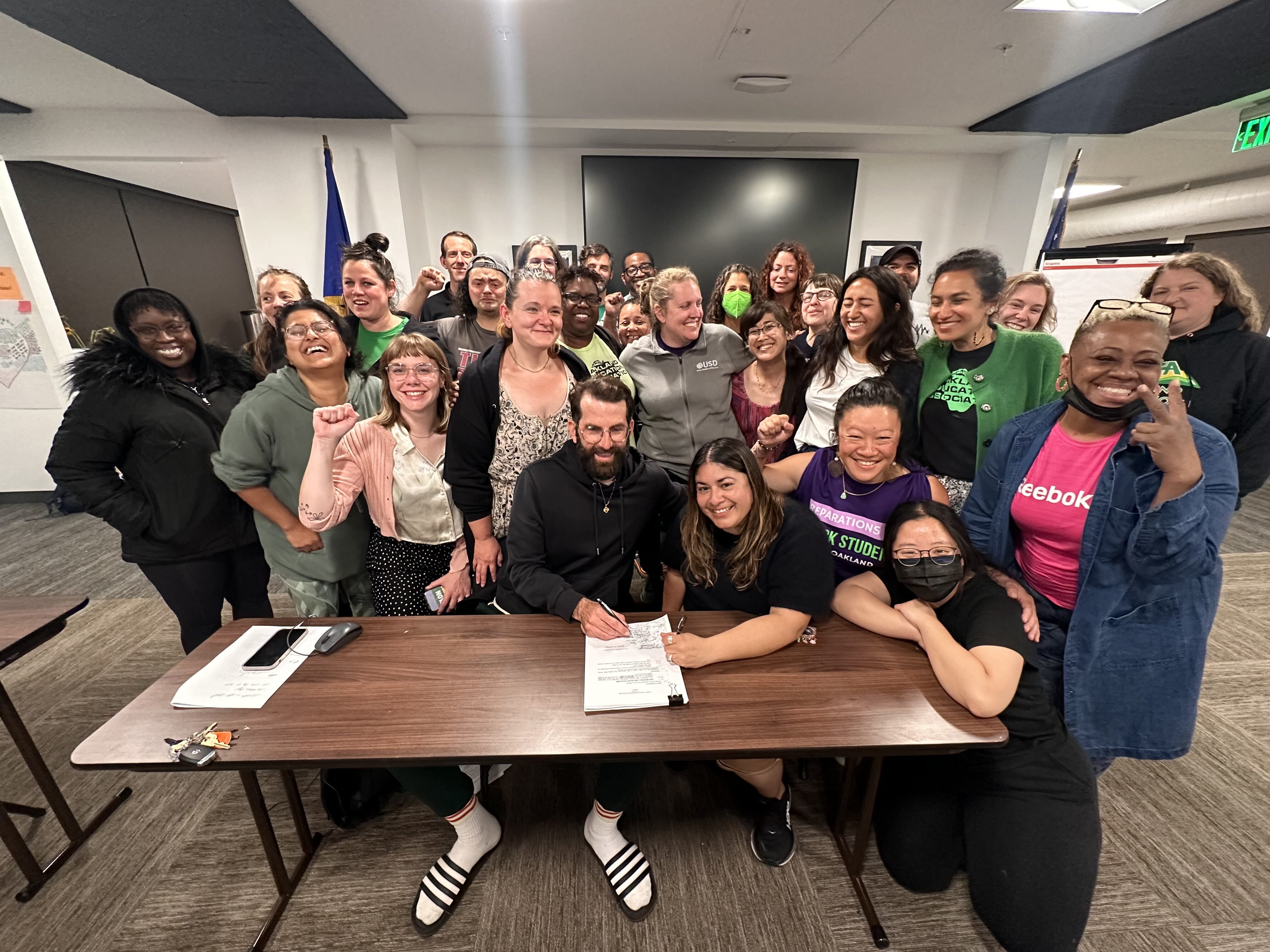
In Oakland, public schools are the hubs of communities. They are centers of enrichment, belonging, engagement and safe spaces for our families. Educators are invested in their students’ overall well-being, which includes mental health support and access to resources that help them thrive in and out of the classroom. Members of the Oakland Education Association (OEA) know that students’ lives don’t begin and end at the classroom door. Just like we saw in Chicago and Los Angeles, Oakland educators, who are also among the lowest-paid educators in the area, talked to families and organized to develop common good proposals.
OEA’s 2nd Vice President Kampala Taiz-Rancifer, along with other teacher leaders, parents and community members knocked on the doors of and called 8,000 families and held parent meetings at schools, to work with Oakland families to identify shared decision-making in community schools, safe schools, support for Black thriving community schools (schools with 40 percent or more Black students) and housing for unhoused students as top priorities. Those priorities were turned into OEA’s “Common Good” proposals at the bargaining table.
OEA and the Oakland Unified School District (OUSD) began negotiations for a new contract in October of last year. OUSD district administrators demonstrated egregious bad-faith negotiation tactics for months. Negotiators didn’t show up to sessions, canceled late, and when they did arrive, they were often severely underprepared to bargain. On May 1, International Workers Day, OEA announced an Unfair Labor Practice Strike to demand the district negotiate in good faith and come to an agreement on living wages for Oakland educators and OEA’s Common Good proposals.
OEA bargained with an expansive team of more than 50 educators from almost every school in the district, and they refused to give up on their demands. They also engaged in a fully transparent and open bargain – they shared all proposals with the community on their website, provided daily emails and sent text blasts to all members. This was the first time they had a big bargaining team, and they are working to expand it so that every site is represented next time.
The picket lines grew stronger and stronger every day of the seven-day ULP strike, with allies, other unions, families, students and elected officials showing up to support. The streets were filled with music and talent courtesy of OEA music and dance teachers, thousands marched and spirits remained high. Boots Riley even made an appearance!

After seven days on strike, OEA won! Among addressing the social and educational reforms that are common good priorities, the historic agreement includes significant raises for ALL educators, with an even greater percentage increase for new teachers, to prioritize recruitment. An EdSource analysis found that Oakland teachers, up until now, were among the lowest-paid mid-career teachers statewide. Also agreed to are retroactive pay and bilingual stipends for teachers with dual language aptitudes. The agreement also calls for more school librarians, guidance counselors and school nurses. For the first time, OUSD will employ guidance counselors at the elementary school level.


OEA member Mayra Alvarado
“The fight wasn’t just about teachers being able to earn enough to put a roof over their head in high-priced Oakland,” said OEA President Ismael Armendariz. “The fight was also about students and their families having a roof over their heads and a more holistic approach to meeting our students’ needs. In a similar vein, this is about a teacher being able to put bread on their table and it is also about feeding young minds. It’s about more than a paycheck, it’s about the common good.”

OEA President Ismael Armendariz, OEA member Olivia Udovic and others marching in the streets of Oakland.
Photo credit: Brooke Anderson
“This fight has never only been about teacher salary. This isn’t just about us trying to get a living wage, or to be able to afford the housing here in Oakland. It’s also been about making sure that our students have the ability to be housed. This fight has never simply been about us being able to put food on our own tables, but making sure that we were able to provide not only services, but also shifting the way we were able to provide instruction, to feed the minds of these students,” said OEA 2nd Vice President Kampala Taiz-Rancifer.

OEA 2nd Vice President Kampala Taiz-Rancifer
Photo Credit: Brooke Anderson
“I’m proud of the work our big bargaining team did to develop proposals that reflect the reality of our working and learning conditions in Oakland. We were advocating for what our students and members need – more school psychologists, more counselors, secondary teacher librarians, a workload model that addresses the increasing responsibilities of special education teachers, smaller class sizes, and common good language that puts power in the hands of families, students, and community to make decisions that impact them every day. It was also a fight to get fair pay for the lowest-paid teachers in the Bay Area and among the lowest in California. The teacher retention crisis will not be solved with compensation alone and that is why we had a big bold bargaining team engaged in this big work. It was so empowering to have families and the community behind us during the seven days we were on strike. Having 98 percent of our members on the picket line showed the unity of OEA during the most critical moments of our contract negotiations and I hope that this energy continues into contract implementation and beyond to continue pushing our district to do the right thing for Oakland schools,” said Samia Khattab, teacher librarian at Franklin Elementary School and OEA bargaining team member.

Samia Khattab addressing the crowd during a rally on day five of the ULP strike.
“I didn’t know what I was getting into when I started. I was so proud to have been a part of this team. Being able to form friendships and relationships with people is what brought us to the finish line with the strongest agreement possible. We went into this with a big dream to make Oakland better, and I feel we planted the roots to continue to grow,” said Rachel Martin, elementary school educator at Piedmont Avenue, OEA bargaining team member and communications co-chair.

Rachel Martin with her Piedmont Avenue Elementary School colleagues.
The tentative agreement passed with a 90% yes vote. The fight continues to protect public education and advocate for the resources Oakland students deserve.

OEA’s bargaining team, led by Vilma Serrano and Timothy Douglas, signing their historic agreement at 3 o’clock in the morning.
The Discussion 0 comments Post a Comment